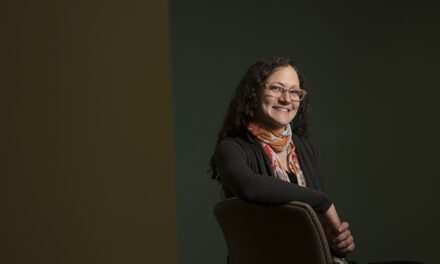
Assistant Editor Emily Rose Cole: Sarah Jane Cody’s stunning flash piece “We Are Preparing Every Day To Die” imagines a world in which school shooter drills have evolved into drills to teach children “how to die peacefully and with grace.” The true terror in Cody’s piece isn’t the science-fiction logic of numbing children to the idea of their own deaths but rather how close to Cody’s reality we already are. In a country that militarizes the police, posts guards in public schools, and suggests arming teachers to combat shootings, the logic of these dystopian “dying drills” doesn’t seem so misguided.
To hear Sarah read the story, click below:
We Are Preparing Every Day to Die
Because there was nothing else to do, we decided to teach our children how to die peacefully and with grace. They could become accustomed to dying and so would no longer be jealous of, or fear, the future.
There was a drill held in schools. An actor playing the role of the baddie would dress in all red and enter a classroom unannounced. When the baddie aimed a cocked pointer finger at a student, that student died. The chosen students would fall down, like it really happened. They let themselves collapse onto the floor, where they lay as if boneless, unmoving from whatever positions they landed in. They weren’t supposed to resist. They imagined the blood escaping from their bodies—this was part of practicing. If students fell on top of each other, they stayed that way until the drill ended. Sometimes a drill lasted just ten minutes. Sometimes an hour––to get them really used to it.
As part of the drills, the parents were also notified. Those of us who could rushed to the scene, where we were forced to wait, while the acting police barred our entry until the building was declared secure. No, they’d say, they didn’t know whose children they were. No, there was no information. We practiced holding each other and weeping. People we had never spoken to. We shoved our faces into each other’s musty-smelling chests. We imagined our children in various states of dead––and, then, it was always a relief to find out that your child hadn’t been chosen that time. And if they had, well, you felt in some way stronger than the other parents, who hadn’t suffered; they didn’t know. You were more prepared now. And with each repetition, you grew increasingly fortified.
As a parent, I knew it was important after a drill not to embrace your child any more tenderly than usual. It was important to go on like normal, as if this were a normal event on a normal day. In this way, we all grew more comfortable with what seemed only a likely future.
It got easier.
One day when I picked up Aila from the fourth grade, she was so proud, telling me that she didn’t mind being dead anymore. She was so good at it, she said. Most of the time she just fell asleep while dead. “I don’t mind one bit.” That particular day, she’d slept so soundly she’d even had a dream as she lay on the floor, her legs pinned beneath the body of a classmate.
“It was the weirdest dream, Mom,” she said. “I was old. I was just sitting there, and I was so old, my hair was all white and falling out. I wasn’t really doing anything. I was just old, just sitting there. Isn’t that weird?”
Something hitched in my throat. I don’t know what. It felt heart shaped.
I agreed with Aila. It was a strange dream to have.
Sarah Jane Cody’s fiction has appeared or is forthcoming in Washington Square Review, No Tokens, Pembroke Magazine, and Necessary Fiction. She was a finalist for Pleiades’s 2018 G.B. Crump Prize in Experimental Fiction. She’s at work on a novel.
For more miCRo pieces, CLICK HERE










